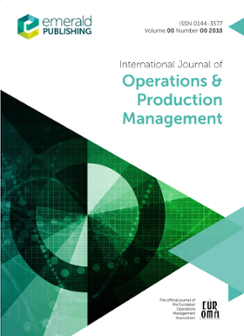解决供应商可持续发展的不当行为:对非市场利益相关者争论的回应策略
IF 7.1
2区 管理学
Q1 MANAGEMENT
International Journal of Operations & Production Management
Pub Date : 2021-05-18
DOI:10.1108/IJOPM-01-2021-0018
引用次数: 3
摘要
企业越来越多地对其供应商的社会和环境实践负责。非市场利益相关者现在毫不犹豫地通过动员示威、社交媒体活动和抵制来对抗采购公司的供应商的不当行为。本文旨在发展目标企业在面临此类竞争时的应对策略类型,并实证研究这些策略在这些企业之间差异的原因。设计/方法/方法借鉴社会运动和利益相关者突出理论,作者提出了一组假设,将他们的四种反应策略类型与三个关键的背景因素——非市场利益相关者突出、非市场利益相关者意识形态和目标公司声誉——联系起来,并使用基于图像的实验方法对它们进行检验。结果表明,非市场利益相关者的显著性显著影响反应的性质(拒绝或让步),而非市场利益相关者的意识形态显著影响反应的强度(微不足道或激烈)。有趣的是,当面对利益相关者的竞争时,公司的声誉对他们的应对策略没有显著影响。原创性/价值本文为现有文献增加了理论和方法论价值。从理论上讲,本研究发展并检验了对非市场利益相关者竞争的反应策略的综合类型。在方法上,本研究在利用基于小插曲的实验方面具有独创性,该实验允许在供应商可持续性不当行为之后建立响应策略的因果因素。本文章由计算机程序翻译,如有差异,请以英文原文为准。
Addressing supplier sustainability misconducts: response strategies to nonmarket stakeholder contentions
PurposeFirms are increasingly accountable for their suppliers' social and environmental practices. Nonmarket stakeholders nowadays do not hesitate to confront buying firms for their suppliers' misconducts by mobilizing demonstrations, social media campaigns and boycotts. This paper aims to develop a typology of response strategies by targeted firms when they face such contentions and to empirically investigate why these strategies vary among those firms.Design/methodology/approachDrawing on social movement and stakeholder salience theories, the authors develop a set of hypotheses linking their typology of four response strategies to three key contextual factors – nonmarket stakeholder salience, nonmarket stakeholder ideology and the target firm reputation – and examine them using a vignette-based experiment methodology.FindingsThe results suggest that nonmarket stakeholder salience significantly impacts the nature of response (reject or concede), whereas the nonmarket stakeholder ideology is significantly related to the intensity of response (trivial or vigorous). Interestingly, the firms' reputation was found to have no significant effect on their response strategy when they faced stakeholder contentions.Originality/valueThis paper adds both theoretical and methodological value to the existing literature. Theoretically, the study develops and tests a comprehensive typology of response strategies to nonmarket stakeholder contentions. Methodologically, this study is original in leveraging a vignette-based experiment that allows establishing causal factors of response strategies following a supplier sustainability misconduct.
求助全文
通过发布文献求助,成功后即可免费获取论文全文。
去求助
来源期刊
CiteScore
13.30
自引率
17.20%
发文量
96
期刊介绍:
The mission of the International Journal of Operations & Production Management (IJOPM) is to publish cutting-edge, innovative research with the potential to significantly advance the field of Operations and Supply Chain Management, both in theory and practice. Drawing on experiences from manufacturing and service sectors, in both private and public contexts, the journal has earned widespread respect in this complex and increasingly vital area of business management.
Methodologically, IJOPM encompasses a broad spectrum of empirically-based inquiry using suitable research frameworks, as long as they offer generic insights of substantial value to operations and supply chain management. While the journal does not categorically exclude specific empirical methodologies, it does not accept purely mathematical modeling pieces. Regardless of the chosen mode of inquiry or methods employed, the key criteria are appropriateness of methodology, clarity in the study's execution, and rigor in the application of methods. It's important to note that any contribution should explicitly contribute to theory. The journal actively encourages the use of mixed methods where appropriate and valuable for generating research insights.

 求助内容:
求助内容: 应助结果提醒方式:
应助结果提醒方式:


